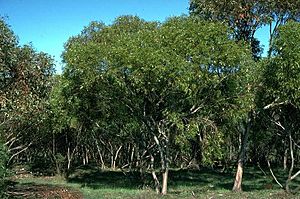Ooragmandee facts for kids
Quick facts for kids Ooragmandee |
|
|---|---|
 |
|
| Eucalyptus oraria south of Dongara | |
| Scientific classification |
|
| Kingdom: | Plantae |
| Clade: | Tracheophytes |
| Clade: | Angiosperms |
| Clade: | Eudicots |
| Clade: | Rosids |
| Order: | Myrtales |
| Family: | Myrtaceae |
| Genus: | Eucalyptus |
| Species: |
E. oraria
|
| Binomial name | |
| Eucalyptus oraria L.A.S.Johnson
|
|
| Script error: The function "autoWithCaption" does not exist. | |
| Synonyms | |
|
Eucalyptus tamala D.J.Carr & S.G.M.Carr |
|
Script error: No such module "Check for conflicting parameters".
Eucalyptus oraria, often called ooragmandee, is a special type of mallee plant. It grows only in Western Australia, mostly along the coast. This plant has smooth, grey bark and long, thin leaves. Its flowers are white, and its fruits look like small barrels.
Contents
About the Ooragmandee Plant
The ooragmandee is usually a mallee. This means it's a shrubby tree with many stems growing from the ground. It can grow from 1 to 15 metres tall. Sometimes, it might be a small tree or a low bush.
What Does Ooragmandee Look Like?
Ooragmandee has smooth, grey bark. This bark peels off in strips. Sometimes, the bottom of its trunk has rough, flaky bark.
Young plants have dull green leaves. These leaves are shaped like an egg or a spear. They are about 50 to 90 millimetres long. They are also about 13 to 35 millimetres wide.
Adult leaves are shiny green on both sides. They are shaped like a spear. These leaves are 65 to 100 millimetres long. They are 8 to 23 millimetres wide. Each leaf has a stalk called a petiole, which is 8 to 15 millimetres long.
Ooragmandee Flowers and Fruit
The flower buds grow where the leaves meet the stem. This spot is called the axil. There are usually 9 to 19 or more buds in a group. These groups grow on a stem called a peduncle, which is 5 to 15 millimetres long. Each individual bud has a tiny stalk called a pedicel, about 1 to 3 millimetres long.
Mature buds are oval shaped. They are 4 to 7 millimetres long and 2 to 4 millimetres wide. They have a rounded cap called an operculum.
Ooragmandee mainly flowers from August to October. Its flowers are white. After flowering, the plant produces fruit. The fruit is a woody, barrel-shaped capsule. The parts that open, called valves, are below the rim of the fruit.
How Ooragmandee Got Its Name
The Eucalyptus oraria was first officially described in 1962. A scientist named Lawrie Johnson gave it its name. He found specimens of the plant near Dongara in 1960.
The second part of its scientific name, oraria, comes from the Latin word orarius. This word means "pertaining to the coast." So, its name tells us it lives near the coast!
Where Ooragmandee Lives
Ooragmandee grows in sandy soil. It is often found over limestone rocks. It lives in coastal and near-coastal areas of Western Australia. You can find it from near Jurien Bay up to near Kalbarri. It also grows on some islands close to the shore.
 | Emma Amos |
 | Edward Mitchell Bannister |
 | Larry D. Alexander |
 | Ernie Barnes |

